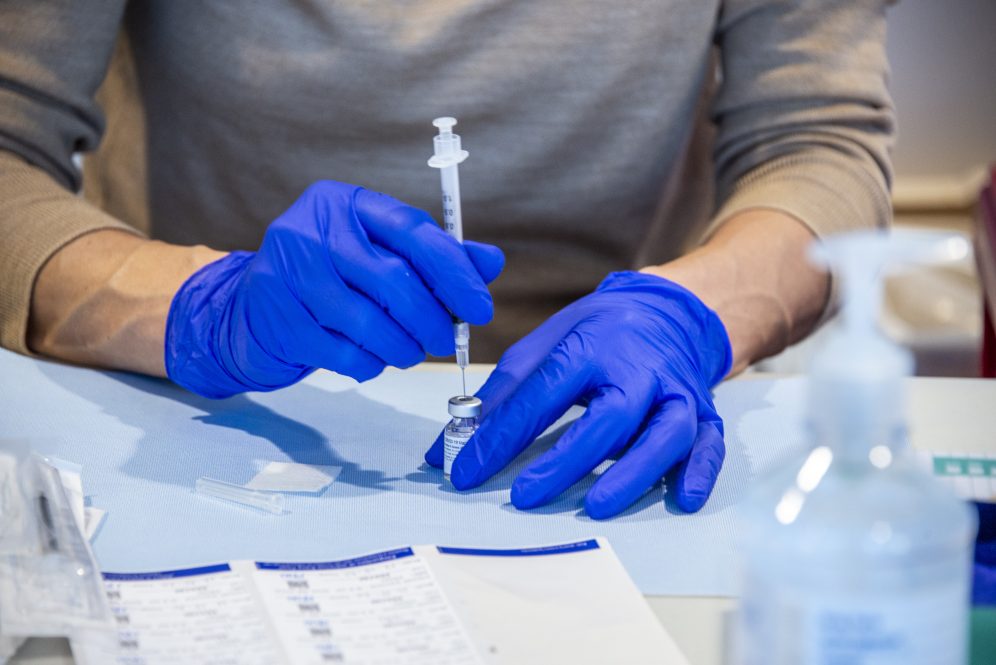An updated version of the COVID-19 vaccine is now available, and with it comes the updated recommendation for another round of boosters. The U.S. Food and Drug Administration recently amended the emergency use authorization of both Pfizer and Moderna’s COVID-19 vaccines to include what’s known as a bivalent formulations to be offered as booster doses.
Dr. David Banach, infectious diseases physician and hospital epidemiologist at UConn Health, explains the significance of these updated boosters.

What’s the difference between the monovalent and bivalent vaccines?
The monovalent vaccines are the ones that have been available thus far. They contain a small piece of the mRNA component of the virus based on the original SARS-CoV-2 virus, sometimes termed as the “ancestral strain,” and are designed to generate an immune response to that original virus.
We’ve seen with the omicron variant — and specifically with the BA.4 and BA.5 subvariants, which have appeared most recently — the virus has changed. The bivalent vaccine contains both the portion of the original ancestral virus mRNA as well as a portion of mRNA that is specific for the BA.4 and BA.5 subvariants that have been circulating most recently. The hope is, by more specifically targeting the most recent subvariants, the bivalent boosters will reduce the impact of COVID both on individuals who received them as well as the population.
Conceptually it’s analogous to what has been done with the influenza vaccine. The technology’s a little different but it’s based on the same idea. It’s targeted against both the original strain and the BA.4 and BA.5 subvariants of omicron.
What becomes of the monovalent vaccine?
At this time the vaccination program will be a primary vaccine series with the original monovalent vaccine and booster doses using the bivalent vaccine.
Why wouldn’t we just start people with the bivalent vaccine?
Data showed the monovalent vaccine upfront provides that high level of protection. The bivalent vaccine has not been evaluated as a primary vaccine candidate, so we don’t have the data to support its use in that context. That’s how it was originally designed, to be a booster.
What are the updated recommendations for who gets which booster(s) and when?
The recommendation from the ACIP (Advisory Committee on Immunization Practices), which was supported by the CDC (Centers for Disease Control and Prevention), was that a single dose of a bivalent vaccine is recommended for anyone 12 or older, who is at least two months from either their primary vaccine series or a prior monoplane booster dose.
That includes people who already were up to date on their boosters, including those who’ve already had more than one booster, like those 50 and older and/or who are deemed immunocompromised?
Yes, as long as you are at least two months from your most recent monovalent booster, you’re eligible for a bivalent booster.
Should we expect multiple versions of bivalent or even trivalent formulations over time as additional variations of COVID-19 take form, similar to how we handle influenza each year with multiple strains in an annual vaccine?
It’s difficult to predict what the future holds for COVID vaccines. The virus has shown it can change so we may likely see additional variants in the future, and potentially some seasonality. Plus, the mRNA technology can be adapted to address future variants so it’s possible that we may see further adjustments to COVID vaccines in the future.
What else should we know about this new round of boosters?
One thing to note is, the bivalent Moderna vaccine is only authorized for those over 18. So those who are with the 12-to-18 age range can only get the Pfizer bivalent vaccine. For ages 5 to 11, we’re still waiting for recommendations on them. They remain eligible for boosters with the monovalent vaccine.
When making a decision about the timing of your next booster, one should take into account the timing of your most recent booster and whether or not you’ve had a recent infection, which is probably from BA.4 or BA.5 and therefore likely has provided at least short-term protection. Factoring those together would help guide the decision on the timing of the booster, and is worth a consultation with your physician.
The bivalent booster is available at UConn Health. Schedule via MyChart or by calling 860-679-5589.



